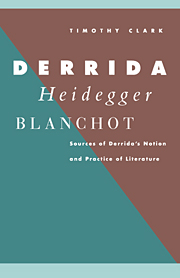2 - Blanchot: the literary space
Published online by Cambridge University Press: 15 August 2009
Summary
écrire, ‘ce jeu insensé d'écrire’ [Mallarmé]
Écrire, l'exigence d'écrire : non plus l'écriture qui s'est toujours mise (par une nécessité nullement évitable) au service de la parole ou de la pensée dite idéaliste … mais l'écriture qui, par sa force propre lentement libérée (force aléatoire d'absence), semble ne se consacrer qu'à elle-même qui reste sans identité et, peu à peu, dégage des possibilités tout autres, une façon anonyme, distraite, différée et dispersée d'être en rapport par laquelle tout est mis en cause.
[Writing, ‘this insane game of writing’]
[Writing, the exigency of writing : no longer the writing always placed (by unavoidable necessity) at the service of speech or of so-called idealist thought … but the writing which, through the slow liberation of its genuine force (an aleatory force of absence), seems consecrated only to itself, which remains without identity and which gradually gives rise to possibilities of quite another nature, an anonymous manner of being and relating, vacant, deferred and scattered, by which everything is put in question.]
Among those things placed in question by such a radical notion of writing are the ideas of God, the Self, the Subject, Truth, Unity and of the Book or Work. This hyperbolical, even portentous, series of claims may well have a familiar sound to readers of Derrida. The quotation, however, is not from Derrida, but from Maurice Blanchot, the preface to L'entretien infini (1969). Indeed, most aspects of Derrida's work find what seem to be close analogues or precedents in Blanchot's work, though in fact the relation is far more complex than that.
- Type
- Chapter
- Information
- Derrida, Heidegger, BlanchotSources of Derrida's Notion and Practice of Literature, pp. 64 - 107Publisher: Cambridge University PressPrint publication year: 1992



